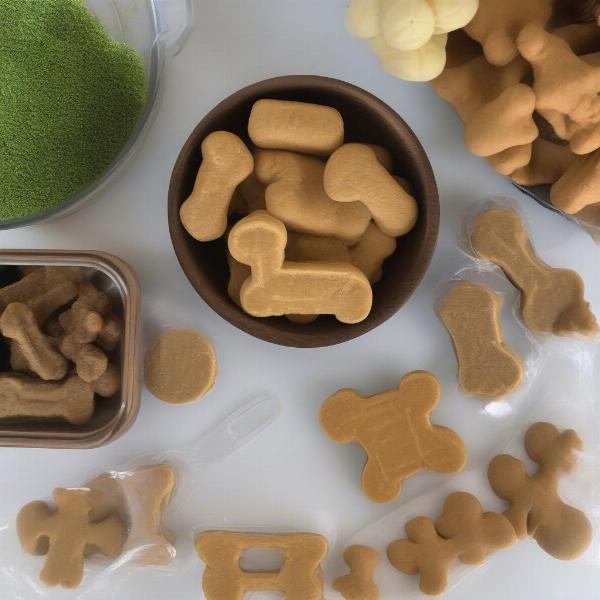Hot dogs, while a common human snack, aren’t always the best choice for our canine companions. “Saucisses hot dog recette,” or hot dog recipes, often involve ingredients that can be harmful to dogs. This article delves into the potential risks of feeding your dog hot dogs and offers healthier, dog-friendly alternatives that will satisfy their cravings without compromising their health.
While the occasional small bite of plain, cooked hot dog might not cause immediate harm, feeding them regularly or in large quantities can lead to various health problems. Hot dogs are high in sodium, fat, and preservatives, all of which can negatively impact a dog’s health over time. Certain seasonings and toppings commonly used in hot dog recipes, such as onions and garlic, are toxic to dogs.
Understanding the Risks of Hot Dogs for Dogs
The high sodium content in hot dogs can lead to dehydration and, in severe cases, even sodium ion poisoning. Excessive fat intake can contribute to pancreatitis, a painful and potentially life-threatening inflammation of the pancreas. Furthermore, the nitrates and nitrites used as preservatives in hot dogs have been linked to an increased risk of certain cancers in dogs.
Traditional hot dog toppings can also pose a danger. Onions and garlic, often used in hot dog recipes, contain compounds that damage a dog’s red blood cells and can lead to anemia. Other common toppings like mustard and relish often contain high levels of sugar and sodium, further contributing to potential health issues.
Healthy Homemade Dog Treat Recipes
Instead of sharing your hot dog, consider making homemade dog treats that are both delicious and nutritious. These allow you to control the ingredients and ensure your furry friend is getting a healthy snack.
Simple Peanut Butter and Banana Treats
These treats are easy to make and packed with healthy ingredients. Mash a ripe banana and mix it with natural peanut butter (make sure it doesn’t contain xylitol, which is toxic to dogs). Roll the mixture into small balls or use cookie cutters for fun shapes. Bake at a low temperature until firm.
Chicken and Sweet Potato Chews
These chews are perfect for dogs who love to gnaw. Boil or bake sweet potatoes until soft, then mash them. Mix with cooked, shredded chicken. Spread the mixture thinly on a baking sheet and dehydrate at a low temperature until chewy.
 Homemade Dog Treats
Homemade Dog Treats
Commercially Available Dog-Safe “Hot Dog” Alternatives
Several commercially available treats mimic the shape and texture of hot dogs but are made with dog-safe ingredients. Look for treats specifically formulated for dogs, avoiding those intended for human consumption. Always check the ingredients list to ensure they are free of harmful additives and toxins.
Carrot and Chicken Sausage Treats
These treats offer a healthy alternative to traditional hot dogs, providing essential nutrients and a satisfying chew.
Single-Ingredient Meat Chews
Chews made from single ingredients like beef, chicken, or turkey offer a simple and protein-rich snack.
Can Dogs Eat Hot Dog Buns?
While plain white bread in small amounts isn’t inherently toxic to dogs, it offers little nutritional value. Hot dog buns often contain added sugars and preservatives that can be detrimental to a dog’s health. It’s best to avoid giving your dog hot dog buns altogether and opt for healthier treat options.
Conclusion
While the aroma of a sizzling hot dog might be tempting to share with your furry friend, prioritizing their health is crucial. By understanding the risks associated with hot dogs and exploring healthier alternatives, you can ensure your dog enjoys delicious treats without compromising their well-being. Remember, a balanced diet and appropriate treats are essential for a long and happy life for your canine companion.
FAQ
-
What should I do if my dog accidentally eats a hot dog? Monitor your dog for any signs of distress, such as vomiting, diarrhea, or lethargy. If symptoms appear, contact your veterinarian immediately.
-
Are there any types of hot dogs that are safe for dogs? No. Even low-sodium or “all-beef” hot dogs still contain ingredients that are not ideal for canine consumption.
-
What are some other human foods I should avoid giving my dog? Other foods to avoid include chocolate, grapes, raisins, onions, garlic, xylitol, and macadamia nuts.
-
How can I tell if a commercially available treat is safe for my dog? Always check the ingredients list and look for treats specifically formulated for dogs. Consult your veterinarian if you have any concerns.
-
What are the best types of treats to give my dog? The best treats are those made with natural, wholesome ingredients and are tailored to your dog’s specific dietary needs and health conditions.
-
How often should I give my dog treats? Treats should only make up a small portion of your dog’s daily caloric intake. Consult your veterinarian for guidance on appropriate treat frequency and portion sizes.
-
Can I make my own dog food to ensure it’s healthy? While homemade dog food can be a good option, it’s crucial to ensure it’s nutritionally balanced. Consult with a veterinary nutritionist to create a recipe that meets your dog’s specific needs.
ILM Dog is a leading online resource for dog owners worldwide, offering expert advice on all aspects of dog care, from breed selection and health to training and nutrition. We provide valuable information, practical tips, and product recommendations to help you ensure the well-being of your canine companion. For expert guidance tailored to your dog’s specific needs, contact us at [email protected] or call us at +44 20-3965-8624. ILM Dog is dedicated to helping you provide the best possible care for your furry friend.